|
|
|
Sort Order |
|
|
|
Items / Page
|
|
|
|
|
|
|
| Srl | Item |
| 1 |
ID:
113098
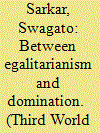

|
|
|
|
|
| Publication |
2012.
|
| Summary/Abstract |
This article presents the problem of governing differences as a problem of constituting a social whole out of the play of antagonistic elements like class, caste, gender, religion, etc, which is essentially a modernist political project in its normative grounding. The problem is explored here vis-à-vis the trajectories of global capitalism and the options for development (that is, the transition from an agrarian economy to an industrial one) for the smaller federal states. The experience of the Left Front Government in West Bengal, India is analysed to understand the issues at stake. The narrative presented in the article shows that questions of land ownership and freedom from oppression and bodily toil remain the fundamental political problem which determines the course and dynamics of governance of differences, particularly its egalitarian mode. This problemat also points towards the limits of agrarian modernity, which many post-colonial countries have tried to constitute.
|
|
|
|
|
|
|
|
|
|
|
|
|
|
|
|
| 2 |
ID:
113102
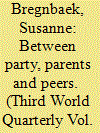

|
|
|
|
|
| Publication |
2012.
|
| Summary/Abstract |
This article explores the lived contradictions entailed in being a young member of the Chinese Communist Party (ccp) today. The focus is on how political and existential issues intersect. It explores party membership as a strategy for personal mobility among Beijing elite university students by providing an ethnographic account of the quandaries of two young ccp members. Even though one student is of rural origin and the other has an urban elite background, in both cases party membership has been pursued as a strategy for opening paths to the future and tied to a quest for self-development rather than a matter of wishing to make sacrifices for the country. The article focuses on how the two students' efforts play out differently. At the same time it is argued that a sense of moral and existential ambiguity goes hand in hand with both of their party membership strategies, leading to an experience of division.
|
|
|
|
|
|
|
|
|
|
|
|
|
|
|
|
| 3 |
ID:
113095
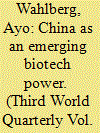

|
|
|
|
|
| Publication |
2012.
|
| Summary/Abstract |
Asia's dramatic entry on to the global biotech scene has not gone unnoticed by commentators and social scientists. Countries like China, India, South Korea and Singapore have been identified as 'emerging biotech powers'. Consequently scholars have begun examining the particularities of how biotechnologies (eg stem cell science, genetic testing and reproductive medicine) have come to be taken up and grounded in a variety of cultural, legal and socioeconomic contexts. They have also examined how governments, scientists, clinicians and others have been engaged in efforts to build up endogenous biotech sectors as a part of nation-building strategies. In this article, rather than attempting to answer questions of what makes biotechnology particularly Asian, I will instead investigate how demarcations and boundaries are mooted in global negotiations of what constitutes 'good' biotechnology. The analysis is based on a collaborative project between Chinese and European scientists and experts on the ethical governance of biomedical and biological research. I show how an underlying condition for the negotiations that took place within this collaboration was the proposition that difference matters when it comes to developing, organising, carrying out and overseeing biotechnological research in a particular country.
|
|
|
|
|
|
|
|
|
|
|
|
|
|
|
|
| 4 |
ID:
113092
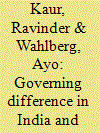

|
|
|
| 5 |
ID:
113093
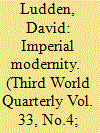

|
|
|
|
|
| Publication |
2012.
|
| Summary/Abstract |
In the recently generalised historical coincidence of neoliberal free-market policy trends with accelerating global economic growth and inequality, India and China stand out as world regions with distinctive histories of imperial inequity. The rise of Asia shows that globalisation does not work the same way everywhere. In Asia historical dynamics of imperial territorialism generate inequities that fit global patterns through their absorption and mediation of capitalism. Economic reforms that brought Asia into global leadership ranks express imperial forms of power, authority, and inequity whose long histories need to be understood to make sense of Asia and global capitalism today. This article focuses particularly on India.
|
|
|
|
|
|
|
|
|
|
|
|
|
|
|
|
| 6 |
ID:
113097
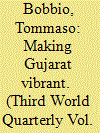

|
|
|
|
|
| Publication |
2012.
|
| Summary/Abstract |
A significant aspect of India's postcolonial history has been the rise of subnationalism-popularly addressed as the challenge of regionalism-which has often pitted the Indian state against the regional centres of power. In fact, the organisation of Indian territory along linguistic lines favoured the emergence of regional movements challenging the authority of the central government in arguments typical of nationalist rhetoric, such as the specificity of language, territory and traditions. This notion of subnation, however, has taken a new turn during the past two decades of neoliberal reforms as regional states compete with each other to attract greater foreign and domestic investment and to secure higher growth rates. Taking as a point of departure the case of 'Vibrant Gujarat', this article proposes rethinking the emergence of subnational cultures in the past two decades in the light of the effects of the neoliberal economic reforms and the rise of Hindu extremist movements in the political arena.
|
|
|
|
|
|
|
|
|
|
|
|
|
|
|
|
| 7 |
ID:
113094


|
|
|
|
|
| Publication |
2012.
|
| Summary/Abstract |
The idea of a post-1990s re-formed India is shaped by an imaginary of a fractured body of the nation-a 'new' nation in tune with the neoliberal desires of a structurally adjusted world and the 'old' nation constitutive of superfluous matter in excess of that seductive world. This imaginary is not only etched in popular discourses but also in the policy-making apparatus engaged in the task of creating a global identity for India. Taking the Brand India initiative-promoted by the Indian state to produce positive images of the nation for global publicity-as a case study, this article argues that in this shift from nation building to nation branding, the very idea of prosperity and equity has now become first and foremost a matter of image. In this world of images, one can also witness how a competitive strategy to seek more corporate investments through concerted brand campaigns has redefined the relationship between the nation and corporations. While earlier it was the corporations which sought the endorsement and patronage of the sovereign, now it is sovereign nations which are seeking to become the most 'favoured investment destinations' that purvey global capital.
|
|
|
|
|
|
|
|
|
|
|
|
|
|
|
|
| 8 |
ID:
113096
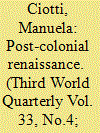

|
|
|
|
|
| Publication |
2012.
|
| Summary/Abstract |
Arjun Appadurai has argued that 'the materiality of objects in India is not yet completely penetrated by the logic of the market'.1
However, the entry and the visibility of modern and contemporary Indian art into the circuits of the global art world increasingly challenge this argument. The story of modern and contemporary Indian art is one of the inscription of local objects and their 'Indianness' into the above circuits, with market value being created inthe process. If the globalisation of the art world provides a conceptual and material arena where objects are circulated, displayed and bought and sold through auction houses, exhibitions, biennales and art fairs, this article analyses an event that epitomises some of the forces at play in this arena: the contemporary art exhibition 'The Empire Strikes Back: Indian Art Today' held in 2010 at the Saatchi Gallery, London. An artistic cum business instantiation of 'India in Europe'-and one that challenges the visual and aesthetic canons 'traditionally' associated with India-this article examines this exhibition as anentry point into the analysis of how neoliberal capital produces 'culture', and into the tension between the commodity form and the infinite possibilities, and unintended consequences, opened up by this very status.
|
|
|
|
|
|
|
|
|
|
|
|
|
|
|
|
| 9 |
ID:
113101
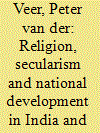

|
|
|
|
|
| Publication |
2012.
|
| Summary/Abstract |
This article addresses the question of the relationship between religion and national development in India and China. It argues that instead of looking at secularisation as a necessary process in national development, one should focus on secularism as a powerful project of intellectuals and the state in these societies. In the post-colonial period, anti-consumerism in China took the form of Maoist secular utopianism, while in India it took the form of Gandhian religious utopianism. The article argues that religious elements can be found in both Indian and Chinese secularisms.
|
|
|
|
|
|
|
|
|
|
|
|
|
|
|
|
| 10 |
ID:
113099


|
|
|
|
|
| Publication |
2012.
|
| Summary/Abstract |
In both the academic debate as well as in Chinese politics urban-rural difference is a frequently used categorisation. Policies addressing previous neglect of rural China have been the official top-priority of China's current leadership since it came to power in 2003-2004. This article argues that we need to nuance the distinct dichotomy between urban and rural, and look into the specifics of how differences are actively mobilised when claims are made. The article builds on extensive fieldwork on the claims made by land-losing peasants and local political leaders on the urban-rural boundary in one of the front posts of the current regime's refocus on rural development, Chengdu, appointed as an experimental zone of Urban-Rural Integration (cheng-xiang yitihua) along with Chongqing in 2007 and, as a result of this, subject to massive restructuring of land use. Instead of a clear-cut urban-rural boundary that would have the potential to split the country in two, I find a much more finely masked form of differentiation based on where people are from. Both local leaders and citizens in each locality may bend and interpret rules and regulations considerably as long as their claims do not go beyond their locality.
|
|
|
|
|
|
|
|
|
|
|
|
|
|
|
|
| 11 |
ID:
113100
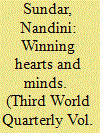

|
|
|
|
|
| Publication |
2012.
|
| Summary/Abstract |
Exploring an ongoing civil war between Maoist guerrillas and the Indian government, this article looks at how emotions are mobilised, conscripted and engendered by both sides. The focus is, however, on the state's performance of emotion, including outrage, hurt and fear-inducing domination, as part of its battle for legitimacy. Intrinsic to this is the privileging of certain kinds of emotions-fear, anger, grief-and the emotions of certain kinds of people over others. Subject populations are distinguished from citizens by the differential public acknowledgement of their emotional claims.
|
|
|
|
|
|
|
|
|
|
|
|
|
|
|
|
|
|
|
|
|